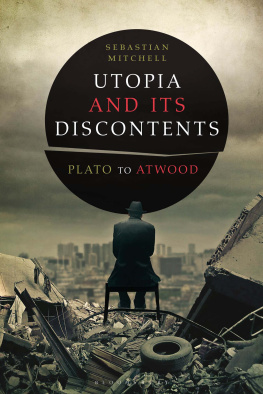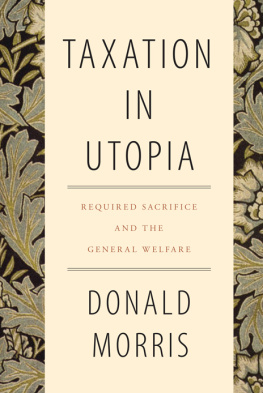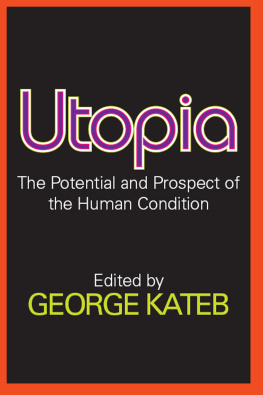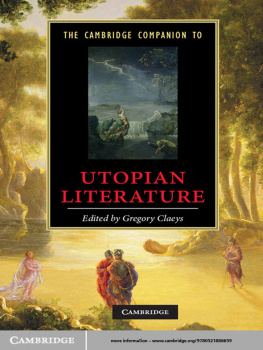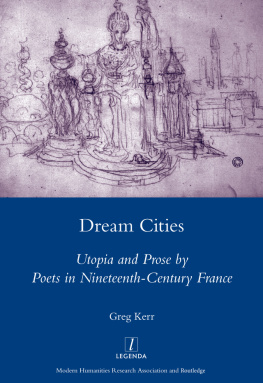
Utopia and Its Discontents
For Rachel, Alasdair, Phoebe and Connie

Contents
Hans Holbein the Younger, Portrait of Sir Thomas More, 1527, oil on oak, 74.2 cm x 59 cm, The Frick Collection, New York, Copyright The Frick Collection.
Hans Holbein the Younger, Preparatory Drawing for the Family Portrait of Thomas More, 1527, pen and brush over chalk outline on Japanese paper, 38.9 cm x 52.4 cm, Kunstmuseum, Basel.
Johannes Vermeer, The Milkmaid, c. 1660, oil on canvas, 45.5 cm x 41 cm, Rijksmuseum, Amsterdam.
Kelly McGillis as Rachel Haas, Witness, 1985, film still, film directed by Peter Weir, Paramount Pictures, All Rights Reserved.
It has taken me some time to complete this book, and I have accumulated a good number of debts along the way. I have been fortunate to have worked over the last few years with a group of stimulating and supportive colleagues in the Department of English Literature at the University of Birmingham. They have read drafts and proposals and commented on these with a suitable combination of candour and circumspection. I have also benefited from the enthusiasm and support from librarians, archivists, keepers and curators in the United Kingdom, North America and continental Europe, who have guided me through their collections. Gerald Br and Peter Hanenberg were good enough to invite me to speak on utopian themes to staff and students at the Universidade Aberta and the Universidade Catlica, Portuguesa in Lisbon in 2017; and they gave the project some much needed impetus as a consequence. And I have accumulated debts of a more incidental, but no less significant kind, such as to the long-standing friends who invited me to stay on their own tropical island paradise in order to complete a portion of this study.
I am grateful to the following, though this is hardly an exhaustive list: Hugh Adlington, Judy Gumbo Albert, Dorothy Butchard, Paul and Maria Chamberlain, Diletta de Cristofaro, Louise Curran, Ken Dowden, Ian Duncan, Rex Ferguson, Marjory and Allen Flynn, Claude Fretz (for being the most steadfast and encouraging of research assistants), Andrzej Gasiorek, Howard Gaskill, Stuart Gillespie, David Griffith, Dave Gunning, Matt Hayler, Kate Heard, Andrew Hodgson, John Holmes, Nikolai Jeffs, Luke Kennard, Tom Lockwood, Deborah Longworth, Larry McCallister, Rebecca Mitchell, Rowan and Hope Mitchell, Dan Moore, Elizabeth and Duncan Murray, Adam Rounce, Kate Rumbold, Valarie Rumbold, Wendy Scase, Sue Schweik, Dan Vyleta, Nathan Waddell, Peter Wiley and Gillian Wright.
The research for Utopia and Its Discontents was conducted at the following libraries, galleries and museums: British Library, National Library of Scotland, Library of Birmingham, University of Birmingham Library, Thomas Fisher Rare Book Library, University of Toronto, Berkeley Public Library, Oakland Museum of California, National Portrait Gallery, Royal Collections, Windsor, Frick Collection, New York and Kunstmuseum, Basel. I was fortunate to receive an award from the Research and Knowledge Transfer Fund in the College of Arts and Law, University of Birmingham. The grant allowed me to visit the Margaret Atwood archive at the University of Toronto. I have benefited as well from periods of institutional study leave. My editors at Bloomsbury, David Avital and Lucy Brown, have been unfailingly supportive of this project, and David has shown the patience of Job. And I must also thank Bridget Pugh, who first gave me the idea to write a book about literary utopianism (and its downside). But my final and most heartfelt thanks go to the lively dedicatees of this volume for creating a domestic utopia, even if, like most families, we only glimpse that blissful state intermittently.
As a topic of study Utopia recedes further from view the closer one approaches it, like granules of sand slipping through ones fingers. As soon as one arrives at a workable definition, then all other possible categories and interpretations seem to be on the verge of overwhelming that particular position. Of course, one might argue that such difficulties were apparent pretty much from the outset. Thomas Mores coinage of Utopia fused the notion of a good place with no place. Ou means no in ancient Greek; and theres a homophonic play with eu meaning good; topos means place. Because Utopia (1516) was written in Latin, More then added a Latin suffix ia. As a Greek scholar, More would also have been aware of the shifting and contradictory significance of the authentic Greek terms behind his neologism: the noun atopia suggests strangeness, oddness, absurdity, eccentricity; and the associated term atopos can refer to a paradoxical state of affairs. Anecdotal evidence suggests that utopia remains in common parlance either as a wished-for state, or the suggestion of a superlative in a given institution, service or object, though sometimes the terms very familiarity means it is little more than a vaguely attractive label. Hence utopia can be found on such fond things as a seaside villa and a lovingly restored campervan, but it is also the name of a range of bathroom furniture, a garden-design firm, a hairdressing salon, the title for a collection of electronic music, and a standard model of fluted wine glass (with the word Utopia etched onto the foot).
Utopia also has a long-standing negative sense, especially when the abstract noun has been derived from its adjective.
Utopia became a byword for the kind of regulated and interventionist tendencies of the socialist state to be rebuffed by neo-liberalism. David Wrights thesis has a revisionist Marxian complexion; and he concedes there is a paradoxical aspect to this undertaking, not least because Marx was wary of the fantastical forms of social and economic projection which the term utopia could connote.
It is still possible to use the term utopia and the notion of utopianism within the fields of political theory and economics in a positive sense. David M. Bells Rethinking Utopia: Place, Power, Affect (2017), for example, attempts to identify what might constitute an ideal society from what looks like a post-anarchist position; and he utilises an improvisational, associative style of presentation to make his case. Yet the works which have enjoyed extensive public interest have tended to link utopia to concrete economic and fiscal measures. In Capital in the Twenty-First Century (2014), for example, Thomas Piketty describes his studys central measure of a global progressive tax on wealth as a useful utopia, in which the universal charge would serve as a worthwhile reference point, as standard against which alternative proposals can be measured.stage, however, that unlike many of the grand utopian schemes of the late Victorian era, utopianism, as a matter of public economic discourse in the twenty-first century, has become largely a matter of advocating a single measure, intended to improve upon the available social and economic models, without necessarily sweeping away the current order to achieve this end.
As an article of faith or even theory, one might suggest that it is never entirely possible to separate the political and social from their means of expression; but this studys central focus is on the utopian in its literary context, even as that entails examining its social and political components. This analysis necessitates tracing those rhetorical aspects already apparent in Mores beguiling and playful coinage, that the very state which is being evoked is being subjected to various kinds of aesthetic pressures in the moment of its articulation. Even if one wished to do so, one could not overlook Ernst Blochs
Next page
